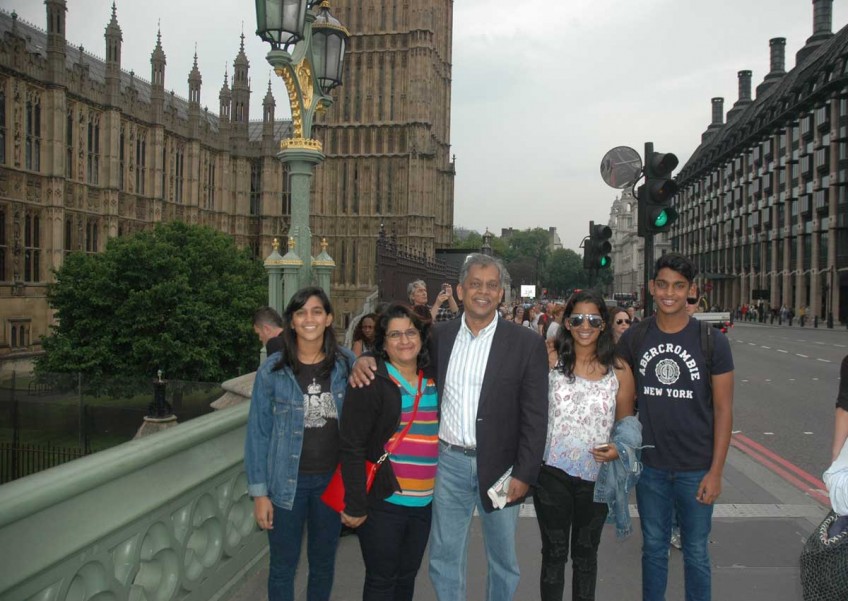Mixing business with charity

LONG before corporate social responsibility became a fashionable term, Mr Edmund Rajendra and his business partner Abdul Shukor have been mixing charity work with their business.
The two run Eastern Carpets from a cosy corner of Raffles City Shopping Centre. While many well-heeled customers drop by to choose a beautiful carpet to adorn their homes, Mr Rajendra and his partner also hold carpet auctions in Singapore, Malaysia, Indonesia, Vietnam, the Philippines, Thailand and Japan.
"Most of our auctions are charity based and we have been able to support our business as well as assist charities to raise funds. This has been a personal privilege to us as we are able to somehow help the less fortunate while conducting our business," said Mr Rajendra during a chat at his showroom.
"In the course of our promotions and auctions, we have also been requested to auction paintings, tour and resort packages, religious icons, golf-related items, and many others, to assist various organisations to raise funds for charity."
How did his business and charitable work come to extend beyond Singapore?
Carpet auctions were quite big in Singapore in the '80s.
It used to be a regular feature on Saturday afternoons at the Marco Polo hotel (which was converted into a condominium in 1999), located at the junction of Tanglin Road and Grange Road.
The auctions were popular with the expat crowd who, when they moved to other countries for work, started to invite Mr Rajendra and his partner to hold such auctions in those cities.
Nowadays, they hold four or five auctions a month and between 15 and 20 per cent of the total sales is given to charity.
Talking to Mr Rajendra is an education in itself. His business has taken him to areas where tourists don't go. In the early days of his career in the carpet business, he used to work for Oriental Carpet Palace, owned by a businessman who was then the honorary consul-general of Turkey to Singapore.
In the '70s and early '80s, Mr Rajendra travelled to the major carpet-weaving countries like Iran, Afghanistan, Turkey, USSR, Pakistan and India.
"These numerous educational trips broadened my knowledge of handknotted carpets tremendously, as I had the privilege of being in areas that were restricted to tourists. I was able to experience the lifestyle of the villagers and observe how carpets were woven in the remote tribal areas.
I also had first-hand experience of carpet weaving in the tribal belt, like the shearing of wool, the spinning of the yarn and the dyeing methods," said Mr Rajendra, 62, who is the president of Singapore's Handknotted Carpet Association.
He and Mr Shukor set up Eastern Carpets in 1988, 11 years after he strayed into the business.
Mr Rajendra was pursuing a diploma in accountancy after his A levels and giving tuition in the same building where Oriental Carpet was located.
The owner offered him a job to take care of his accounts, but noticing Mr Rajendra's friendly and pleasing disposition, he gradually groomed him in the buying and selling side of the trade. Mr Shukor was then working there and the friendship Mr Rajendra struck with him has continued to this day.
The carpets on sale at the Eastern Carpets showroom come from Iran, Afghanistan, Russia, Turkey and India. Mr Rajendra says that all the carpets are sourced directly.
"Each and every piece in our showroom is individually selected by both Shukor and I. This has always been our forte from day one," said Mr Rajendra with a sense of pride.
For years, carpets from India never made it big overseas but now it is a different story. According to Mr Rajendra, the revolution in Iran had a lot to do with the growth in the Indian carpet's export story.
"After the revolution in Iran (1987), many entrepreneurs from that country set up workshops in north India.
They brought in Iranian master weavers to train Indians to make higher quality carpets, some even finer than Iranian carpets.
As Iranian carpets were banned from many countries, Indian carpets soon made their way to international trade fairs, winning awards.
We bring the best of Indian carpets to Singapore and have promoted them in our talks, exhibitions and auctions.
It has been extremely successful, especially the silk carpets from Kashmir," said Mr Rajendra, who was schooled at St Joseph's Institution and grew up in Kirk Terrace.
He recalled with fondness the "kampung spirit" of those days. He and his siblings, along with his parents, lived in a cluster of pre-war shophouses.
"Neighbours would look out for each other and help was always available whenever needed. We had Indian neighbours, and during festive occasions, exchanged traditional cookies and warm greetings. Until today, we still practise this tradition," said Mr Rajendra, whose parents moved to Singapore from Jaffna in Sri Lanka.
His father was a land surveyor who worked for the Bukit Sembawang Group.
Mr Rajendra, an ethnic Tamil, is married to Suzanne, a Malayali from Malaysia, with whom he has twin daughters and a son. His daughters Sarah and Sonia are A-level students while son Andrew is doing his O levels.
While acknowledging that it is "pressure" period as a parent, he relaxes with the children during weekends by playing tennis.
And the devout Catholic is also involved in church activities. No prizes for guessing who is the auctioneer when the church holds a fundraiser.
patrickj@sph.com.sg

Get a copy of tabla! for more stories.